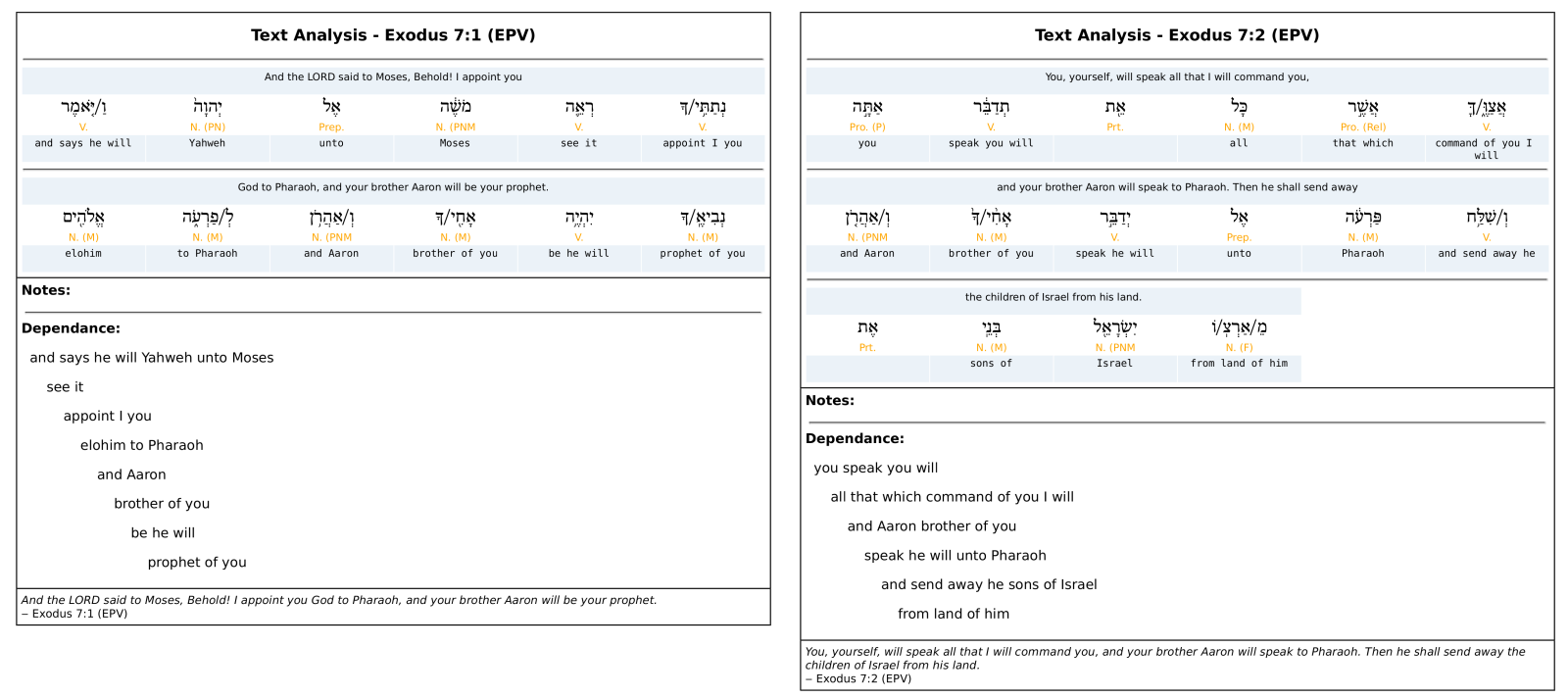The use of the prefix כֵּֽ (as/like) with אלֹהִ֔ים (Elohim) in Genesis 3:5 is sufficient to explain that the serpent is not saying Eve "will be a God", but that she will be "like a God", distinguishing good and evil. However, there is much more happening in Exodus 7 than what we read in Genesis.
I would translate Exodus 7:1-2 like this:
And the LORD said to Moses, "Behold! I appoint you God to Pharaoh, and your brother Aaron will be your prophet. You, yourself, will speak all that I will command you, and your brother Aaron will speak to Pharaoh. Then he shall send away the children of Israel from his land.
Details:

The LORD says this to Moses for a number of reasons:
Pharaoh did not recognise Yahweh as God:
And Pharaoh said, Who is the LORD, that I should obey his voice to let Israel go? I know not the LORD, neither will I let Israel go.
-- Exodus 5:2 KJV
Pharaoh knew Moses was just a man because he grew up in the same household:
And the child grew, and she brought him unto Pharaoh's daughter, and he became her son. And she called his name Moses: and she said, Because I drew him out of the water.
-- Exodus 2:10 KJV
Moses complained twice he wasn't up to the task:
And Moses spake before the LORD, saying, Behold, the children of Israel have not hearkened unto me; how then shall Pharaoh hear me, who am of uncircumcised lips?
-- Exodus 6:12 KJV
And Moses said before the LORD, Behold, I am of uncircumcised lips, and how shall Pharaoh hearken unto me?
-- Exodus 6:30 KJV
The intent was to empower Moses in such a way that the LORD could bring out the leader he knew lay within Moses, and at the same time astound and provoke Pharaoh1 by the powers Moses seemingly possessed.
In regard to bringing out the leader in Moses, one can see a transition through Exodus chapters 7-9 from Moses instructing Aaron before Pharaoh, to Moses speaking and acting on his own:
... thou shalt say unto Aaron, Take thy rod, and cast it before Pharaoh, and it shall become a serpent.
-- Exodus 7:9 KJV
... Say unto Aaron, Take thy rod, and stretch out thine hand upon the waters of Egypt ...
-- Exodus 7:19 KJV
... Say unto Aaron, Stretch out thy rod, and smite the dust of the land ...
-- Exodus 8:16 KJV
In chapters 7 and 8, the LORD gives Moses instructions, which he then, in the presence of Pharaoh, commands Aaron to implement. In this way it appears to Pharaoh that Moses (God) is empowering Aaron (his prophet).
At the end of chapter 8, Pharaoh's magicians are firmly convinced that it's not Moses and Aaron who are behind these wonders:
Then the magicians said unto Pharaoh, This is the finger of God: and Pharaoh's heart was hardened, and he hearkened not unto them; as the LORD had said.
-- Exodus 8:19 KJV
But Pharaoh still couldn't let go of the notion that Moses was nothing other than a man. So, in chapters 9 and 10:
And Moses stretched forth his rod toward heaven: and the LORD sent thunder and hail, and the fire ran along upon the ground ...
-- Exodus 9:23 KJV
And Moses stretched forth his rod over the land of Egypt, and the LORD brought an east wind upon the land all that day.
-- Exodus 10:13 KJV
Pharaoh is now witness to the power of Moses to command thunder and hail and fire and wind. Moses is no longer commanding Aaron, but acting on his own accord, i.e. his faith in the LORD had blossomed.
Such is the quality of this man, however, that at no time did Moses consider himself other than a servant of the LORD (with perhaps one exception). In the passage, commonly known as the "Song of Moses", Moses begins thus:
1Give ear, O ye heavens, and I will speak; and hear, O earth, the words of my mouth. 2My doctrine shall drop as the rain, my speech shall distil as the dew, as the small rain upon the tender herb, and as the showers upon the grass: 3Because I will publish the name of the LORD: ascribe ye greatness unto our God. 4 He is the Rock, his work is perfect: for all his ways are judgment: a God of truth and without iniquity, just and right is he.
-- Deuteronomy 32:1-4 KJV
Regardless of the power that had been invested in Moses, and all that was done through him, he had no other desire than to attribute it all to the LORD, "I will publish the name of the LORD... He is the Rock, his work is perfect, ... all his ways are judgment: a God of truth and without iniquity, just and right is he."
Conclusion
The LORD invested Moses with God-like power to astound Pharaoh, and to rally the Hebrews behind Moses, in order to establish Himself in the world in a remarkable and unmistakable way.
Moses was an exceptional man in that he defied the rule that moves man, "Power corrupts. But absolute power corrupts absolutely." Although the LORD exists beyond the bounds of time, humanity groans as it waits for such exceptional men.
Notes:
1. Pharaoh is kept initially defiant (hard-hearted) because he "knew" Moses was not a God, since they grew up together.
